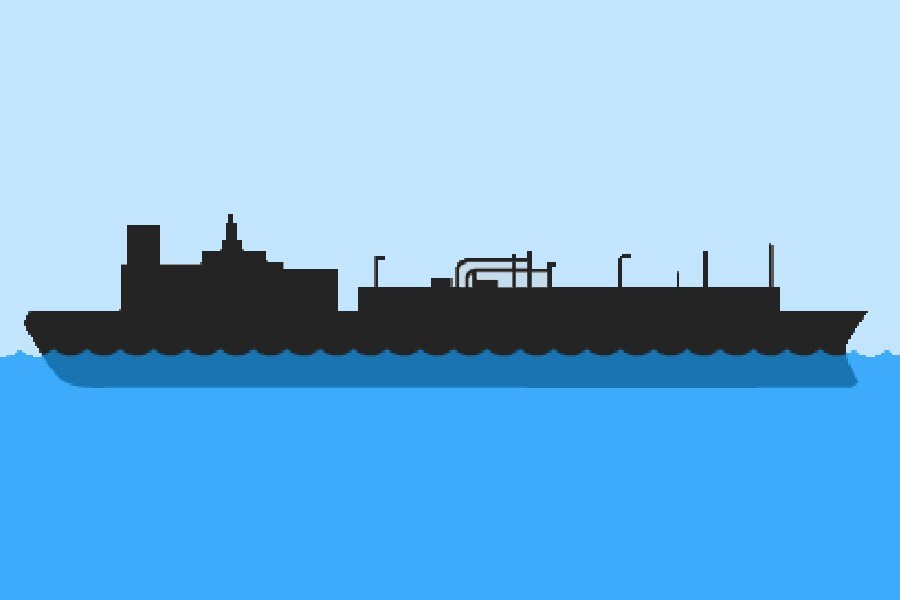Long-term LNG supply: BD, OQ Trading set to sign second SPA
It'll be the country's third such deal

Published :
Updated :

Bangladesh is set to sign another long-term liquefied natural gas (LNG) supply deal with Oman Trading International (OTI) - currently known as OQ Trading - to meet the country's mounting natural gas demand.
The state-run Petrobangla has picked the OQ to ink the sales and purchase agreement (SPA) for LNG supply following successful negotiations, Petrobangla Chairman Zanendra Nath Sarker told the FE.
If inked, it would be the Petrobangla's second long-term deal with the OQ to purchase LNG.
The company is currently supplying the fuel to Bangladesh at lower rate compared to the Qatargas, other long-term LNG supplier.
Besides, Bangladesh managed to partly avert a penalty on delayed payment against LNG import due to good gesture by the OQ.
The OQ had given up its demurrage claim following a request by the Petrobangla, which had to pay such penalty to the Qatargas despite the dollar crisis in the country.
The official did not disclose the amount of demurrage, exempted by the OTI or paid to the Qatargas as penalty.
Of the two long-term suppliers, the Qatargas has a more stringent payment schedule than that of the OTI.
According to the SPAs between the Qatargas and the Petrobangla, the latter has to make payment to the LNG supplier within 15 days of import. But, the Petrobangla has the liberty to make LNG import payment to the OTI within 25 days of import.
Demurrage claim remains effective at London Inter Bank Offered Rate plus 4.0 per cent above the overall import cost, if the Petrobangla fails to make regular payment against LNG import to the supplier, said sources.
This was, however, the first incident of paying demurrage to any supplier since Bangladesh initiated importing LNG around five years back.
The ongoing Russia-Ukraine war resulted in the scarcity of the greenback in both local and foreign banks operating in Bangladesh, and their reluctance to open letters of credit (LCs) against imports led to import-bill default, said the official.
Under its existing deal, the Petrobangla has been purchasing LNG at around 11.9 per cent of the three-month average of Brent crude oil plus 40 cents per million British thermal unit (MMBtu).
The entity also has an SPA with the Qatargas to buy annually up to 2.5 million tonnes of lean LNG for over 15 years.
Under the deal, the Qatargas is annually supplying around 1.8 million tonnes of LNG for the first five years and can raise it to 2.5 million tonnes in the next 10 years.
The purchase price is around 12.65 per cent slope of the three-month average price of Brent crude oil plus 50 cents per MMBtu.
If the Petrobangla has more demand during the first five years, it can increase the import volume to 2.5 million tonnes, and during the next 10 years, it has the option to reduce the amount by 10 per cent every year.
If Bangladesh takes less than the base amount of LNG, in any year, it will have to pay the price on a take-or-pay basis.
Officials said a couple of years back the OQ offered to double its LNG supply to the Petrobangla to around annually 2.0 million tonnes from its existing supply deal for 1.0 million tonnes.
The Petrobangla chairman said, "We were trying to decrease the LNG price from that of the existing contract. The OQ then agreed to decrease the price by around US 5-10 cents from the constant portion of the pricing formula, but we wanted further price cut."
The negotiation later faltered without any headway, added Mr Sarker, who was then in a key position in the energy ministry.
If the Petrobangla could bag the OTI's offer and ink the deal, it could have been able to continue purchasing sufficient quantity of LNG at a cheaper rate compared to those in the volatile international spot market, said sources.
The government could also avoid the path of raising natural gas tariff sharply, and all sorts of consumers including the businessmen could also get natural gas supply at 'affordable' rates, they added.
"Not signing the SPA with the OTI for increasing long-term LNG import was a fault of the government," energy expert Professor Ijaz Hossain told the FE.
Bangladesh started importing LNG in 2018, with the first cargo arriving on April 24, 2018 from the Qatargas for re-gasification in the country's first operational floating, storage and re-gasification unit (FSRU) of the US's Excelerate Energy's "Excellence" with 3.75 million tonnes per year capacity.
The country's second FSRU, owned by the Summit Group - having 3.75 million tonnes per year capacity, was commissioned in April 2019.
Bangladesh will need to import around 30 million tonnes/year of LNG by 2041 - to meet mounting demand from various sectors, including industries, power units and fertiliser plants - as domestic gas reserves are depleting fast, according to the Gas Sector Master Plan 2017.
Domestic natural gas production is now waning after reaching its peak at around 2.70 billion cubic feet (Bcf) per day in 2017.
The country's domestic natural gas production is currently hovering around 2.17 Bcf per day. With around 763 million cubic feet per day (mmcfd) of re-gasified LNG, its overall output is around 2.98 Bcf per day, according to the Petrobangla statistics as on March 15, 2023.
azizjst@yahoo.com


 For all latest news, follow The Financial Express Google News channel.
For all latest news, follow The Financial Express Google News channel.